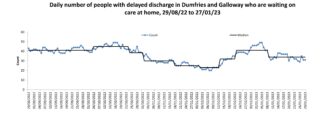Q Exchange
Collaborative transformation of care at home provision in Dumfries & Galloway
- Proposal
- 2023

Meet the team
Also:
- Cara Gillespie, Independent Sector Lead Dumfries and Galloway, Scottish Care
- Euan Macleod, Strategic Planning & Commissioning Manager, DGHSCP
- Sandra Gyaltsen, Care at Home Social Work Lead, Dumfries & Galloway Council
- Donna Maxwell, Performance and Improvement Manager, DGHSCP
What is the challenge your project is going to address and how does it connect to the theme of 'How can improvement be used to reduce delays accessing health and care services'?
We are seeking to address delayed discharge from hospitals, as well as care not yet provided in the community. As of 27th February 2023, 351 local people are awaiting 3222 hours of assessed social care at home.
The project will support transformation of care and support at home in Dumfries & Galloway, building on existing and planned collaborative work between 10 independent sector care and support at home providers, Scottish Care and Dumfries & Galloway Health and Social Care Partnership (DGHSCP)
As well as meeting needs of people waiting right now, we are seeking transformation in how services are provided for the long term. Dumfries and Galloway is a large rural region, with significant geographic and demographic challenges. The heath and social care resource needed for people aged 65 to 84 years is forecast to increase by 35% by 2043. However our working age population is declining and there is already insufficient available workforce to meet peoples’ needs for care.
What does your project aim to achieve?
The overall D&G Care at Home Collaborative objectives are to a) address needs of people awaiting care and b) ensure sustainable care provision, including workforce.
For this project specifically, we have three objectives:
- Enable engagement in collaborative digital transformation work by independent providers.
- Enable collaborative work between Independent Providers and DGHSCP Home Teams.
- Capture learning and evidence of impact
Care at home is spot purchased on the time & task model, and independent sector staff are generally paid for client contact time only. Resource is needed to pay for care workers to engage with additional training and development linked to the collaborative. Funding will be used for staff time, travel costs and backfill.
There is currently no dedicated resource to measure the impact of the Collaborative, including for people and their families. Dedicated Performance & Intelligence/ Data Analyst time will be secured, enabling both quantitative and qualitative research on outcomes and impact.
How will the project be delivered?
We have support from all relevant local teams:
- 10 independent sector collaborative members: 1st Homecare; Annandale Bed & Bath Services; Care Solutions; Cera Care; Crossroads Caring Scotland; Crossroads Care & Support; Guardian Response; Rainbow Care Services; Stewartry Care; Stranraer Skills Station.
- DGHSCP Community Waiting Times Team; Social Work; Home Teams; Digital transformation & AIT project leads; Strategic Planning & Commissioning; Communities Directorate; Performance & Intelligence team
Measuring impact: This is one of the core project objectives
Delivering value for money: Funding will be used for direct costs, based on evidenced actual spend linked to a project work plan.
Managing risk: The project will mitigate a significant risk around independent provider staff capacity to engage fully with collaborative initiatives. Another risk is that the changes we are seeking are not embedded in practice beyond the Test of Change. The funding will help gather, analyse and present evidence of impact to support decision-making and long-term changes in practice.
How is your project going to share learning?
The performance and intelligence/ data analyst resource we are seeking will directly support this, enabling us to gather and share learning from the Collaborative test of change. We are particularly keen to capture qualitative learning, via interviews and case studies, and to produce a report at the end of the project.
The project has significant potential to document the process and evidence the effectiveness of new collaborative approaches, models of care and use of technology in addressing delays and waiting times, as well as learning about the process and impact of transformation and change.
We will generate highly relevant learning for all stakeholders interested in addressing capacity challenges in care at home, particularly in rural areas.
How you can contribute
- Learning from similar approaches in other areas
- 'Critical friends' input, once we have scoped our delivery plans in more detail
Plan timeline
| 3 Jul 2023 | Project inception |
|---|---|
| 28 Sep 2023 | First draft Collaborative Test of Change evaluation report |
| 29 Mar 2024 | Final draft Collaborative test of change evaluation report |
| 20 Dec 2024 | Q Funded element of the project concludes- collaborative ongoing |